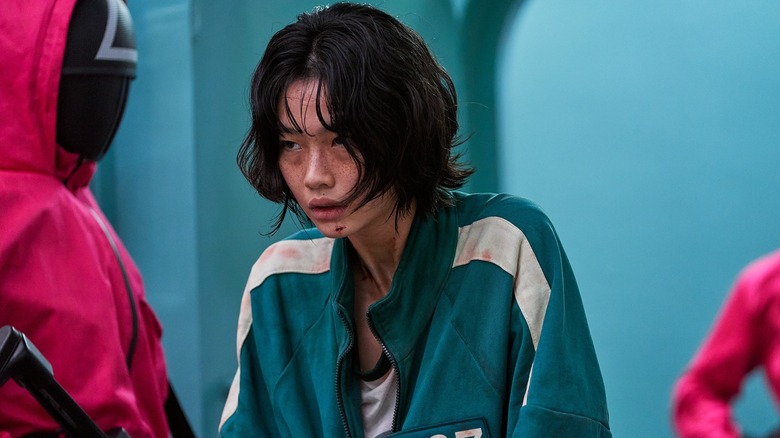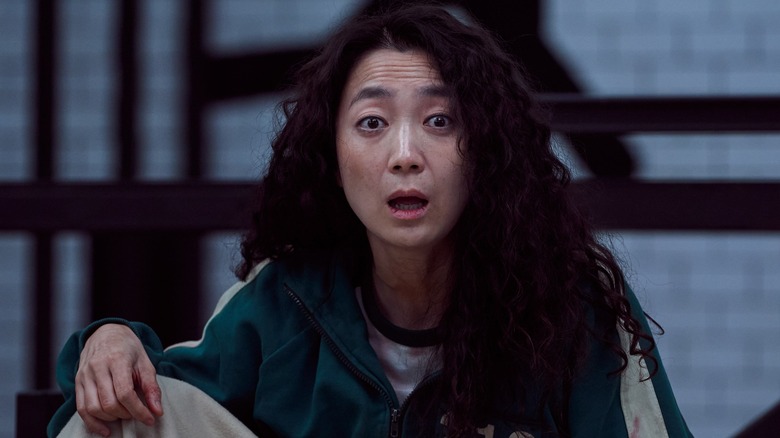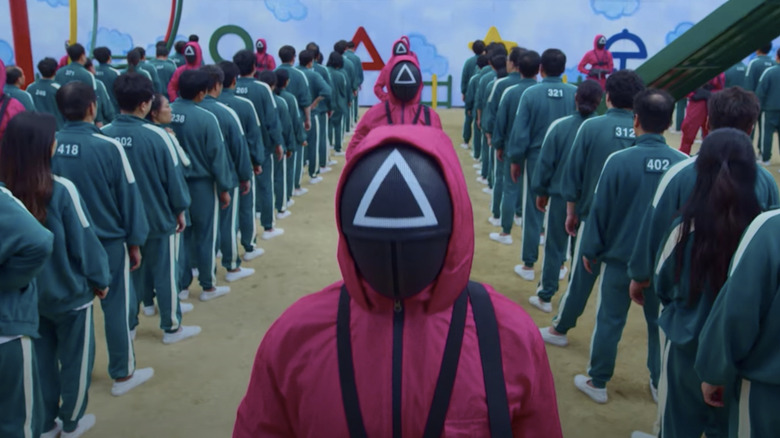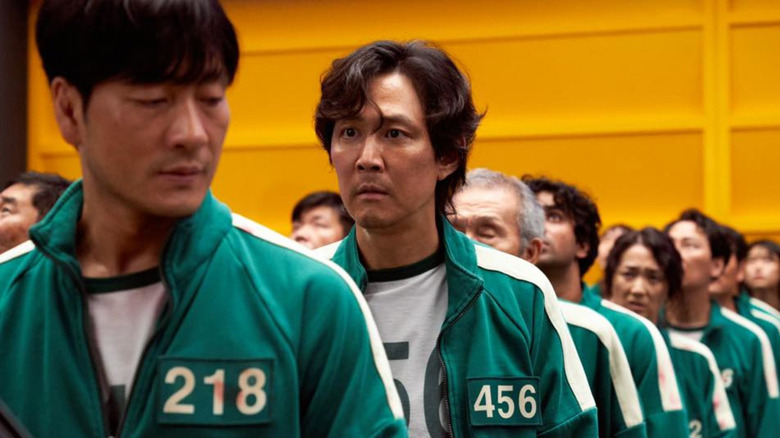Are The English Subtitles For Squid Game Changing The Show's Meaning?
Not since the start of the pandemic when everyone was collectively obsessed with "Tiger King: Murder, Mayhem, and Madness" have people across the globe all had the same water cooler discussions about something other than, well, the world being on fire. Netflix is once again responsible, this time with their distribution of the sensational South Korean survival series, "Squid Game." Audiences are straight up obsessed with "Squid Game." The show was the most-watched series on Netflix in 90 countries, and the show offers subtitles in 37 languages and dubbed versions in 34 languages, allowing even more localized accessibility for viewers around the globe. However, some Korean fans of the show have noted the localization and subtitle changes for the English-language release may be telling an entirely different story than show creator Hwang Dong-hyuk's intended meaning.
Lost in Translation
Youngmi Mayer of the popular Feeling Asian podcast went viral last week when they tweeted about the poor English translation of "Squid Game," noting that "the dialogue was written so well and zero of it was preserved."
not to sound snobby but i’m fluent in korean and i watched squid game with english subtitles and if you don’t understand korean you didn’t really watch the same show. translation was so bad. the dialogue was written so well and zero of it was preserved
— youngmi mayer (@ymmayer) September 30, 2021
Another Twitter user @MrTimCat replied saying, "I found you got different subtitles depending if you chose English or English Closed Caption (with the latter matching the dubbed dialogue and the former being wildly different)."
Mayer, who is fluent in Korean, also took to TikTok to break down exactly just how bad the translation is for English speaking viewers. The video has been viewed over 10 million times.
@youngmimayer #squidgame translations are sooo wrong here’s a little example
In reference to the character Han Mi-nyeo (played by Kim Joo-Ryoung), Mayer said her dialogue "constantly gets botched," explaining that "she cusses a lot and it gets very sterilized." Even phrases that aren't offensive with cursing have been changed, citing an example where "What are you looking at?" gets neutralized to the far more palatable "Go Away." It may seem like a minor change, but the language creators use for their characters is intentional. Changing the dialogue can in some instances completely change the meaning.
Why This Matters
Mayer continues analyzing this character and points out one of the more egregious examples. The subtitles have Mi-nyeo saying "I'm not a genius, but I can work it out," but in actuality, the character is saying, "I am very smart — I just never got a chance to study." Again, it seems arbitrary, but considering "Squid Game" deals with classism, poverty, and the desperate lengths people will go to for financial stability, changing this character trait changes part of the character's motivation.
"That is a huge trope in Korean media: The poor person that's smart and clever and just isn't wealthy. That's a huge part of her character," Mayer said. They continued exclaiming "The [original Korean] writers, all they want you to know about her is that. It seems so small, but it's the character's entire purpose for being in the f – – kin' show!"
A lot of people have tried to place the blame on translators, but Mayer was quick to defend translators on Twitter, and instead placed the blame on producers saying, "The reason this happens is because translation work is not respected and also the sheer volume of content." They continued, "Translators are underpaid and overworked and it's not their fault. It's the fault of producers who don't appreciate the art."
However, it should be noted that Mayer's initial TikToks were actually analyzing the closed captions for the English dub, and not the official English subtitles. Which means that the closed captions would be even less accurate in order to fit the English lines in while the actor speaks. But this strange glitch of showing the CC instead of the real subtitles (which has happened to more than just Mayer) has not yet been addressed by Netflix.
What This Means for Accessibility
Mayer wasn't the only one to point out the translation issues, with plenty of others taking to Twitter and TikTok to express their frustration upon realizing the Korean to English translation has been heavily modified. While Netflix has yet to comment on this situation, there are plenty of theories swirling about. User @Roboluvsunicorn claims to have heard from someone who works as a translator expressing that they're given a word count limit, clarifying, "like they're only allowed a certain amount of text on the screen at a given timestamp."
I heard from talking to a translators there is also a word count limit on... I'm pretty sure it was for netflix. I don't know if this is across the board or just certain shows though . Like they're only allowed a certain amount of text on the screen at a given timestamp
— 👹V👹 (@roboluvsunicorn) October 1, 2021
If this is true, this completely destroys the intent of accessibility. There is no equity to accessing content if the content is modified to the point where the intent has been changed. Many have been excusing the translation changes as a result of localization. By definition, translation is a direct transformation of the text, while localization is a way to modify the language to make more sense from a linguistic and culturalization perspective. One of the easiest examples is the way original Pokemon names are modified to work with English language puns, like "Gastly" being a ghastly floating ghost of gas. However, the changes being made in "Squid Game" don't appear to be the result of localization, but likely as @Roboluvsunicorn pointed out, an issue of how much text translators are allowed to put on screen.
Regardless of the thought-process behind the decision to not directly translate the show, the fact remains that unless you're fluent in Korean, you're likely missing out on the true story of "Squid Game."



